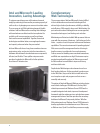
7
services, labor costs for installation, administration, and
operations, and ongoing system management costs.
Windows Server 2008 is designed to win organizations a
great reprieve of total Web service costs by reducing total
management effort, down-time, and more.
Now, Intel carries the Microsoft goal of decreased overhead
to the next level. With Intel Xeon processor–based servers,
providers can decrease the number of servers needed,
reduce energy costs, and cut back on cooling requirements
without sacrificing performance. Low-voltage options, like
the 50-watt Intel Xeon processor use 35% less processor
power consumption while maintaining the same perform-
ance level as the standard quad-core versions.
Even better, Intel’s latest 45nm processor architecture
provides a huge boost to performance (up to 20% faster
transistor switching speeds and up to 50% larger L2 caches)
while simultaneously expanding power management
capabilities for new levels of energy efficiency. That means
better performance in the same footprint at lower power.
The following Intel Xeon processor features also serve
to reduce TCO:
• Demand-Based Switching (DBS) with enhanced
Intel SpeedStep
®
technology for lower power and
footprint costs
• Fully-buffered DIMM technology for a three-fold increase
in memory bandwidth and a four-fold increase in memory
capacity (up to 64 GB)
• New memory controller features including Error Correction
Code (ECC) system bus, new Memory Mirroring, and
I/O hot plug, for improved platform reliability
Simply put, Intel Xeon processor-based servers keep
Windows Server 2008–based web systems performing
and reliable without prohibitively consuming energy.
Windows Server 2008 running on Quad-Core Intel Xeon
processor–based servers empowers organizations to
optimize the benefits of this robust next-generation platform.
Intel Xeon processors magnify the power of Windows Server
2008 for Web, virtualization, and enterprise-class solutions.
Quad-Core Intel Xeon processors running Windows Server
2008 deliver enhanced energy efficiency, performance,
utilization, and reliability. Together, Windows Server 2008
and Quad-Core Intel Xeon processors enable businesses to
grow their computing solutions more efficiently while helping
to keep data centers cool. Individually, the new Web server
technologies from Microsoft and Intel offer outstanding
performance, reliability, and scalability. Together, they create
an ideal platform, not only for virtualization and enterprise
workload balancing, but also for branch office and Web
application serving.
For more information about Intel Xeon processors, visit:
For more information about the Intel and Microsoft
Solutions, visit:
For more information about Windows Server 2008,
including Windows Server virtualization, visit:










